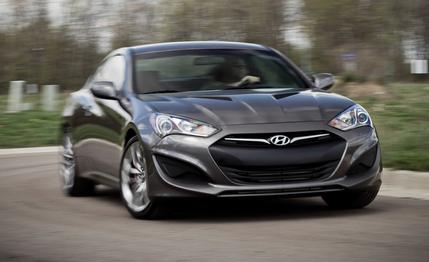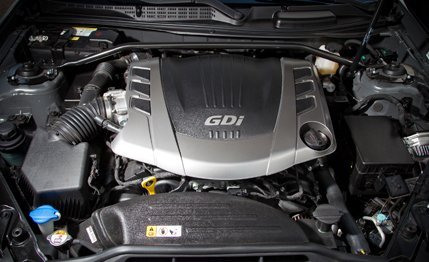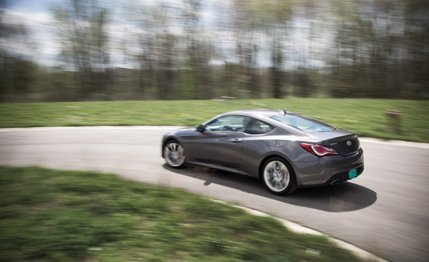
 Instrumented Test
Instrumented Test




Spawned three years ago from a truncated rear-wheel-drive sedan platform, Hyundai’s first Genesis coupe was affordable and fun, and looked great drifting through commercials. But the car lacked refinement on the street, and the base turbocharged four-cylinder struggled to impress without aftermarket help. Hyundai needed a grown-up tuner car that didn’t need to be tuned.
Along with a handsome midcycle face lift for 2013, Hyundai has improved the coupe’s base 2.0-liter, port-injected four with a new twin-scroll turbocharger and a larger intercooler. Horsepower jumps from 210 to a healthy 274 while torque climbs from 223 pound-feet to 275. Although torque peaks at just 2000 rpm, there’s not much thrust from the turbo until the engine spools past 3000. EPA ratings of 21 mpg city and 30 highway for the 2.0T/manual combo in sporty R-Spec trim remain unchanged; we averaged 22 mpg.


With a six-speed manual transmission, the 2.0T R-Spec weighs 3418 pounds, can reach 60 mph in 5.9 seconds, and covers the quarter-mile in 14.4 seconds at 99 mph. That’s nearly a second quicker than before in both measures of acceleration.
Four-pot detractors should note that the coupe’s optional 3.8-liter V-6 also gets upgraded, now with direct fuel injection helping it make a stout 348 horses and 295 pound-feet, up from 306 and 266, respectively. Compared with the still-droning 2.0T, the V-6 plays a great soundtrack. Direct injection helps add 1 mpg to both city and highway ratings, now at 18 and 27 (with the manual). We observed 18 mpg.


The 3482-pound 3.8 R-Spec two-door we tested needed 5.2 seconds to hit 60 mph, 0.3 fewer than before. The quarter-mile went by in 13.8 at 104 mph, or about the same as in a 350-hp Nissan NISMO 370Z. All Genesis coupes are capped at 151 mph.
The R-Specs lack some luxuries you’ll find in the pricier models yet include Brembo brakes, limited-slip differentials, firmer suspensions, and new 19-inch wheels with summer Bridgestones. Both coupes stop from 70 mph in 163 feet. With slightly less weight over the front wheels, the 2.0T holds 0.91 g around the skidpad versus the V-6 model’s 0.90.
Those numbers are familiar from previous tests, as is the feedback from the quick, lively steering. But the feel of the front strut/rear multilink suspension is much improved, with various refinements providing greater body control and more compliance over rough roads. The new, three-stage traction-and stability-control system can be switched off and keeps the tail in check when you’re not imitating Rhys Millen.
Despite revisions to the manual transmission, the clutch pedal feels heavily sprung in both cars and the new sculpted shifter is balky and notchy. Smoothness requires concentration. Pass on the R-Spec, and a new eight-speed slushbox can deliver either powerplant’s output to the rear wheels.
A revised and well-equipped interior includes standard sport seats for all models, and the tilting steering column now telescopes. Overall, there’s a classier feel despite a few remaining hard plastics.


Genesis coupes are on sale now with base prices about $2000 higher for all models and a spread ranging from about $25K to $35K; R-Specs start at $27,375 for the 2.0T and $29,625 for the 3.8.
Although it still has room to improve, there’s a lot more to like about the new Genesis regardless of which engine you choose. It makes us wish the coupe had started out like this in the first place.